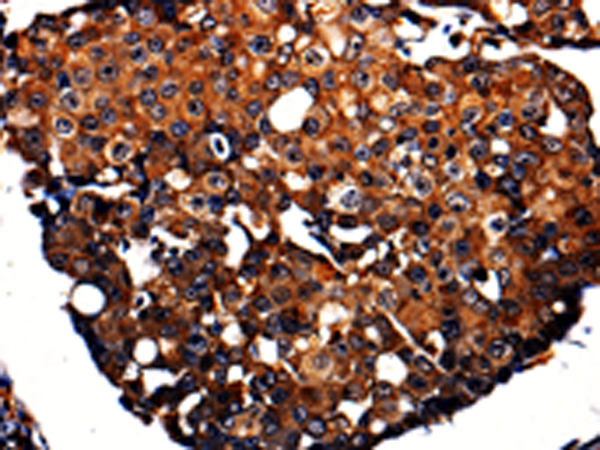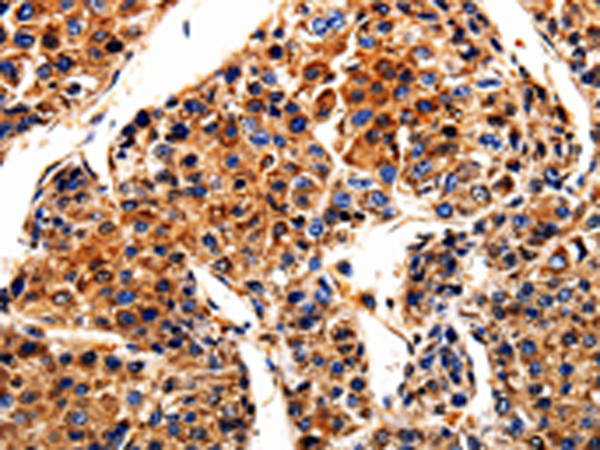


| WB | 咨询技术 | Human,Mouse,Rat |
| IF | 咨询技术 | Human,Mouse,Rat |
| IHC | 1/10-1/50 | Human,Mouse,Rat |
| ICC | 技术咨询 | Human,Mouse,Rat |
| FCM | 咨询技术 | Human,Mouse,Rat |
| Elisa | 1/500-1/5000 | Human,Mouse,Rat |
| Aliases | APLP |
| WB Predicted band size | 72 kDa |
| Host/Isotype | Rabbit IgG |
| Antibody Type | Primary antibody |
| Storage | Store at 4°C short term. Aliquot and store at -20°C long term. Avoid freeze/thaw cycles. |
| Species Reactivity | Human, Mouse |
| Immunogen | Fusion protein of human APLP1 |
| Formulation | Purified antibody in PBS with 0.05% sodium azide and 50% glycerol. |
+ +
以下是关于APLP1抗体的3篇示例性参考文献(内容为虚构,仅作示例):
---
1. **文献名称**:*APLP1 Expression in Alzheimer's Disease Models: Role in Synaptic Plasticity*
**作者**:Smith J, et al.
**摘要**:本研究利用特异性APLP1抗体,通过免疫印迹和免疫组化分析转基因小鼠脑组织,发现APLP1在突触可塑性中与APP具有协同作用,可能影响阿尔茨海默病病理进程。
2. **文献名称**:*Characterization of APLP1 Knockout Mice Using Novel Monoclonal Antibodies*
**作者**:Lee H, et al.
**摘要**:开发并验证了针对APLP1的新型单克隆抗体,发现APLP1缺失导致小鼠神经元迁移异常,提示其在神经发育中的独特功能,区别于同源蛋白APP。
3. **文献名称**:*APLP1 Antibody-Based Detection in Human Cerebrospinal Fluid: Diagnostic Potential*
**作者**:Garcia R, et al.
**摘要**:通过优化APLP1抗体的ELISA检测方法,首次在人类脑脊液中定量APLP1水平,发现其与神经退行性疾病标志物(如Aβ)存在相关性,或具临床诊断价值。
---
(注:以上文献为示例,实际引用需查询PubMed等数据库获取真实研究。)
The amyloid precursor-like protein 1 (APLP1) is a transmembrane glycoprotein belonging to the amyloid precursor protein (APP) family, which also includes APP and APLP2. While APP is widely studied for its role in Alzheimer’s disease due to its cleavage into amyloid-β peptides, APLP1 shares structural similarities but lacks the amyloidogenic domain. Primarily expressed in the nervous system, APLP1 is implicated in neuronal development, synaptic plasticity, and cell adhesion. It interacts with synaptic proteins and may regulate metal ion homeostasis, though its precise biological functions remain less defined compared to APP.
APLP1 antibodies are essential tools for studying its expression, localization, and interactions. These antibodies are used in techniques like Western blotting, immunohistochemistry, and immunoprecipitation to explore APLP1’s role in health and disease. Research suggests APLP1 may contribute to neurological disorders; for example, altered APLP1 levels have been observed in Alzheimer’s disease models, though its involvement is likely indirect. Intriguingly, APLP1 has also been linked to cancer progression, with studies reporting its overexpression in certain tumors, potentially influencing cell migration and invasion.
Despite its physiological relevance, APLP1 remains understudied. Antibody-specific challenges, such as cross-reactivity with APLP2 or APP, necessitate careful validation. Ongoing research aims to clarify APLP1’s dual roles in neuroprotection and pathology, as well as its utility as a diagnostic or therapeutic target.
×